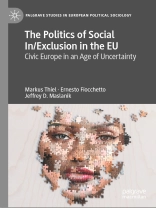This volume provides an updated analysis of the most significant constitutive aspects for the political sociology of the EU. It examines in detail how civic and political activism regarding the inclusion and integration of gender and sexual minorities, as well as migrants and refugees, have become substantial forces in Europe today. It exhibits a political sociology perspective that moves away from the predominant state-centrism and institutional focus in mainstream analyses of European politics. It brings to the fore the role of citizens, civil society and identity politics as well as transnational societal phenomena impacting on the ambivalent civic in/exclusion tendencies prevalent in the EU. The book highlights the linkage of EU institutions and policies to established and new societal actors in response to recent challenges of the EU.
Inhaltsverzeichnis
Chapter 1: European Societies, EU Politics and Social In/Exclusions of minorities.- Chapter 2: Euro-/Refugee-/Security/Fragmentation/Environment/Corona-Crises: the new Europeanized ‘normal’?.- Chapter 3: Identity Politics, Political Mobilization and Social In/Exclusions.- Chapter 4: The politics of in/exclusion in the EU: Gender and sexuality minorities.- Chapter 5: Political Mobilizations regarding gender & LGBT+: Spain, Sweden, Germany and Poland.- Chapter 6: The politics of in/exclusion in the EU: refugees and migrants’.- Chapter 7: Political Mobilizations regarding refugees and migrants: Spain, Sweden, Germany and Poland.- Chapter 8: Conclusion: Social In/Exclusions of minorities in an uncertain European future.
Über den Autor
Markus Thiel is Professor in the Department of Politics and International Relations and Director of the EU-Jean Monnet Center of Excellence, Florida International University, USA.
Ernesto Fiocchetto is Research Assistant at the EU-Jean Monnet Center of Excellence, Florida International University, USA.
Jeffrey D. Maslanik is Visiting Lecturer in Politics and International Relations, Vietnam National University, Vietnam.












